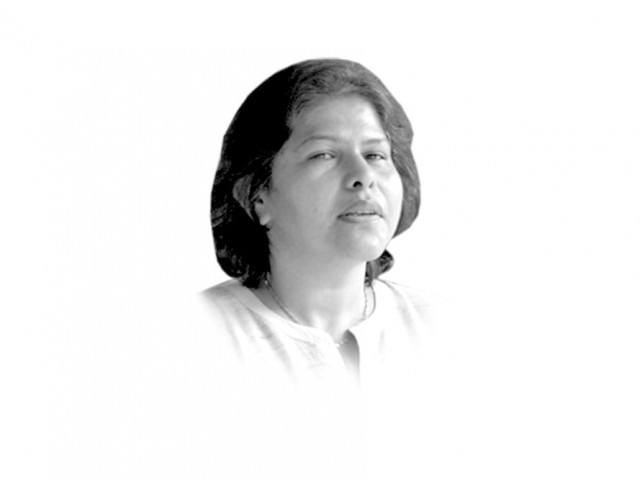Impact of Iran-US deal on South Asia
Pakistan must delink its proxies from foreign governments and intelligence agencies, especially from the Arab world.

The writer is an independent social scientist and author of Military Inc.
The recent Iran-US peace deal is indeed a good development as far as removing the cause of instability in the larger Asian region is concerned. South Asia and the Middle East that have long suffered due to more than a decade of war cannot withstand another protracted warfare between Washington and Tehran. However, the peace deal recently negotiated is being looked upon with suspicion by a lot of regional actors, especially Israel, Saudi Arabia and a number of Gulf States. By renouncing its ambition to develop nuclear weapons, Iran has gained strategic advantage such as creating room for economic and social development without which it could not survive or create a space for itself in the Middle East and the Persian Gulf region. An economically potent Iran can prove more significant than simply a nuclear-armed Iran. Furthermore, the release of financial resources and peace with the US is likely to create space for Iran to play a political role in the region. Thus, the consequent legitimisation of Iran’s role in the area is something which is likely to make both Israel and some of the Arab states highly nervous.
The nervousness of the Arab world could mean that these states could begin to look at other options or cultivate alternatives to balance out Iran. In any case, the Arab states are getting increasingly nervous with the idea of being abandoned by the US. The manner in which Hosni Mubarak was abandoned by Washington or the fact that the US and the Western world at large will have reduced dependence on Middle Eastern oil reserves may result in various uncomfortable scenarios. One situation, which is likely to have disastrous consequences for South Asia in particular, pertains to the Arab engagement with the various non-state actors, particularly those that offer to propagate a religious ideology deemed friendly by the Arab world.
Reportedly, the number of Saudis engaged in the Syrian conflict has increased. These non-state actors may not limit themselves just to Syria but will also find their way into South Asia, especially if they find hosting agents in the form of proxies that seem to be planning to expand their options in Afghanistan and Pakistan after the US pullout from Kabul in 2014. Although there appears to be some form of tacit agreement between the US and Pakistan to eliminate some proxies, it is still not clear if what we are looking at is a consensus on complete elimination of all kinds of violent non-state actors. The continuation of any strategic engagement in South Asia between the state and non-state actors will encourage an environment which will attract a lot of frustrated elements from the Arab world. Indeed, traction towards jihad does echo through higher educational institutions of some of the Arab states.
But allowing such elements to drift into South Asia would be tantamount to adding fuel to fire. A few weeks ago, I was contacted by a journalist claiming to work with a Turkish channel on the issue of Iran-Pakistan relations. More then provocative, his argument suggested a bias which he wanted me to adopt in examining Pakistan’s relations with its south-western neighbour. He insisted on having access to evidence, which he, of course, did not share or elaborate, indicating Tehran’s support to groups inside Pakistan. After some conversation it became clear that what was considered as evidence was basically informal information regarding enhanced financial capacity of individuals or some groups. There was a pattern in this suspicion as it was similar to what was expressed by some ‘strategic thinkers’ on observing the growing size of cakes cut by Hazaras in Balochistan.
The Iran-Saudi Cold War never bode well for South Asia and its continuation will be even more disastrous. Though the sectarian ideological rift has spread, it is still not a popular agenda, at least not as popular as some other causes. For instance, the sectarian violence on its own is still not a proverbial ‘crowd-pulling’ agenda or something that would help raise funds and human resources. An issue like Kashmir, water or India continues to be more attractive. This is the case because the desire for peace has not materialised into something concrete and policymakers have been unable to generate a positive propaganda such as the impact of economic cooperation and similar issues. Under the circumstances, we can continue to have a condition where violent extremist NGOs will continue to use the India factor to draw resources to be diverted towards other issues such as sectarian violence. Many analysts tend to make separate categories for groups that engage in sectarian violence versus those that use Kashmir as a core agenda or others that fight in Afghanistan. Such categories only apply as far as marketing a particular organisation is concerned. Militant organisations that fight in India have fought in Afghanistan as well and subscribe to a sectarian agenda too. These lines will sadly get fuzzy in the coming months or years.
The South Asian region does not benefit from engaging in the Saudi-Iran Cold War. From Pakistan’s perspective, it has to take a clear position with both Tehran and Riyadh, but particularly the Arab states, to delink itself from such conflict. More important, it must look critically at delinking its proxies from foreign governments and intelligence agencies, especially from the Arab world. This is not a game which can be played and won. In fact, the continued presence of proxies will encourage violence which South Asia or adjoining regions can ill-afford.
Published in The Express Tribune, December 5th, 2013.
Like Opinion & Editorial on Facebook, follow @ETOpEd on Twitter to receive all updates on all our daily pieces.















COMMENTS
Comments are moderated and generally will be posted if they are on-topic and not abusive.
For more information, please see our Comments FAQ